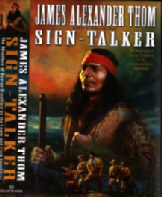
 The Children of First Man
The Children of First Man

With the award-winning Panther in the Sky, James Alexander Thom enhanced his already impressive reputation as a master of historical fiction. Thom's monumental new novel, The Children of First Man, is an epic in the grand tradition that intertwines history, legend, fact, and fable to recreate the 700-year journey of the mysterious white Indian tribe through the heart of the American continent.
Three hundred years before Columbus, a Welsh Prince named Madoc an invincible blond giant of a man crossed the Atlantic with a fleet of wooden boats to plant a colony in the paradise he called Iarghal. For countless generations Prince Madoc's blue-eyed descendants migrated along the great waterways of the primeval New World, mingled their blood, their legends, and their dreams with the native peoples. And as epidemics raged, love and marriage flourished, and savage wars erupted, Prince Madoc's vision of peace with the natives of Iarghal was forgotten. But his spirit of chivalry lived on in the people who called themselves the Mandans.
With its beautifully written and deeply felt descriptions of the feelings the first whites and Native Americans had for each other, The Children Of the First Man tells the fascinating story of a European people gradually absorbed into the American culture until their literacy was lost and their Christian religion submerged in the legend of Madoc, the First Man. Sweeping from the blood-soaked castles of medieval Wales to the landmark expedition of Lewis and Clark, from the hushed beauty of virgin wilderness to the Mandan villages of domed earthen lodges, The Children of the First Man is a triumph of the storyteller's art.
THOM NOVELS GOING ELECTRONIC
Six of James Alexander Thom's historical novels have been selected to be included in Random House's Electronic Book (ebook) publishing program.
The titles chosen for such formats as Amazon Kindle, iPod, and
the Sony Reader are:
LONG KNIFE
FOLLOW THE RIVER
THE RED HEART
SIGN-TALKER
FROM SEA TO SHINING SEA
PANTHER IN THE SKY
The author finds the news good, but ironic, musing, "I use every bit of my skill and imagination to take my readers hundreds of years into the past -- and now they'll visit those old days through the screen of an electronic gizmo."

